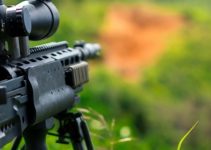Gun Laws in Nevada
The state of Nevada has gun laws unlike other states, despite having child access prevention laws, juvenile possession laws, juvenile transfer laws, and juvenile sale laws. Nevada does not require permits for the purchase of handguns, rifles, or shotguns nor does it require the registration of shotguns, handguns, or rifles. Permits are also unneeded to carry rifles, handguns, and shotguns. Most states require permits to carry any type of handgun, but in Nevada handguns only require permits if they are concealed.
 Owners also do not need to be licensed to own shotguns, handguns, or rifles. Nevada does not have a state waiting period nor is there a sale record. The Federal Bureau of Investigation has the right to run National Instant Checks through their state systems when a firearm transaction has taken place.
Owners also do not need to be licensed to own shotguns, handguns, or rifles. Nevada does not have a state waiting period nor is there a sale record. The Federal Bureau of Investigation has the right to run National Instant Checks through their state systems when a firearm transaction has taken place.
Nevada is largely composed of desert, and over two-thirds of the population of the state lives in the Las Vegas Metropolitan Area. California borders to the west, Arizona to the southeast, Utah to the east, and Oregon and Idaho to the north. Open carry is legal in Nevada with a valid license to carry, and one may possess a handgun in their vehicle without a permit so long as it is visible.
Concealed Weapons
Nevada is often referred to as a “shall issue” state with regards to carrying concealed weapons. Firearms are issued to qualified individuals who have passed the National Instant Criminal System check. A permit is then authorized for the carrying of concealed weapons by the county sheriff.
Certain qualifications apply for obtaining a concealed weapons permit. These include being at least twenty-one years of age; completing a firearms safety course as with the Nevada Sheriff’s and Chief’s Association approval; obtaining an application form though a local sheriff and submitting it along with fees and a training certificate; passing a criminal background check though Nevada law 202.360 with a fee payment; and often providing a photograph and fingerprints.
Once a permit for a concealed weapon has been issued, the permit must be carried with the weapon at all times and will need to be presented when asked by a law enforcement officer. Concealed weapons permits will need to be renewed every five years for residents and will need to be renewed every three years for non-residents.
Even though a permit has been issued, certain establishments restrict any kind of firearm on the premises. These include public schools, public airports, and buildings that state the banning of firearms via a sign.
Carrying Firearms in Vehicles
Nevada permits anyone who is legally allowed to possess firearms to carry them in a vehicle without a permit, openly or concealed. Long guns must be unloaded when transporting in an automobile unless You are paraplegic or have had a leg amputated.
Self-defense Laws
Nevada has both Castle Doctrine and SYG laws. There is no duty to retreat from any place You have a legal right to be. You may use force, including deadly force, in defense of yourself or others if You reasonably believe it is necessary to prevent imminent death, SBI, the commission of a forcible felony, or to stop the unlawful & forcible entry into a dwelling with intent to harm an occupant.
Carry in Restaurants the Serve Alcohol
Yes. Nevada has no laws prohibiting the carrying of firearms in restaurants that serve alcohol. You can carry in a restaurant that serves alcohol. Places like Fridays or Chili’s unless they have a “No Gun Sign,” then it is suggested that You not carry into the establishment. This does not include a bar or the bar area of a restaurant – You are prohibited from carrying into these areas. You can carry Your firearm into a restaurant that serves alcohol, but You are prohibited from carrying while intoxicated (having a blood alcohol level of .10 or greater).
Open Carry
Open carry is legal in Nevada. Places listed in the “Criminal Provisions” above may not be off limits to those who open carry. The state preempts all firearm laws in the state and local authorities cannot have laws/ordinances against open carry. Remember that if You enter any property and the owner/responsible person asks You to leave, You must leave. Failure to leave can result in trespass charges. The minimum age to open carry is 18.
Registration and Demonstration
The state of Nevada does not require that firearms be registered but residents of Clark County must register their concealed weapons with the Clark County law enforcement agency.
Upon registration in the entirety of Nevada, a CCW concealed weapons permit requires a demonstration of the gun to be registered. Because all revolvers are operated the same, any revolver can be used for demonstration but the automatic firearm must be present at the time of the demonstration. Nevada is not the only state that requires a CCW permit for concealed weapons permits, other states also have this requirement. These include Utah, Texas, Tennessee, South Dakota, Oklahoma, Nevada, Montana, Missouri, Minnesota, Michigan, Louisiana, Kentucky, Kansas, Indiana, Idaho, Arizona, and Alaska.
Nevada also honors the State CCW permits of other states, including Tennessee, Ohio, Nebraska, Missouri, Michigan, Louisiana, Kansas, Arkansas, and Alaska. This kind of permit needs to be renewed regularly at the appropriate time periods and will include a fee of one hundred five dollars.
Reciprocal Carry
By statute, Nevada will recognize another state’s license to carry if that state recognizes Nevada’s license:
“A person who possesses a permit to carry a concealed firearm that was issued by a state included in the list prepared pursuant to NRS 202.3689 may carry a concealed firearm in this State in accordance with the requirements set forth in NRS 202.3653 to 202.369, inclusive.”
Anyone contemplating reciprocal carry should check with the official list maintained by the Nevada Law Enforcement Agency at the time the reciprocal carry is to occur. Nevada’s reciprocity agreements can be viewed online.
Criminal Provisions
Under Nevada law, a license to carry a handgun is not valid in any of the following places or circumstances, whether it is issued by Nevada, or a person is carrying pursuant to a reciprocity between his or her state of license and Nevada:
- While under the influence of alcohol (a blood-alcohol concentration of .10 or more)
- While on the property of the Nevada Higher Education or a private or public school grounds or school vehicle
- Any public building who has posted that carry is prohibited
- Any public building located on the property of a public airport
- A public building that has a metal detector at each public entrance, or where a sign is posted at each public entrance
- While hunting from an aircraft, helicopter or motor driven vehicle, including snowmobiles. A paraplegic hunter may shoot from any stopped motor vehicle which is not parked on the traveled portion of a public highway
- Discharge a firearm from, upon, or across any federal or state highway/county road
- Discharge in any public place where any person might be endangered


